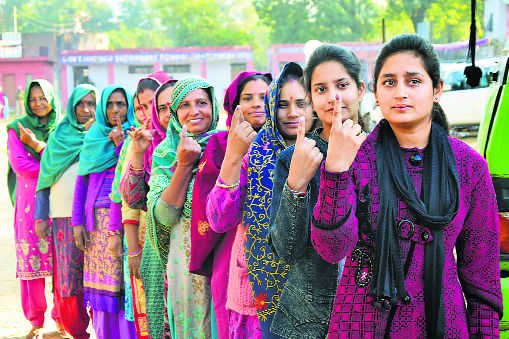
Vote! A means of participation in governance, the poll process is the vital first step.
Wajahat Habibullah
India’s first Chief Information Commissioner
Freedom’s terrible thirst, flooding Kashmir,/is bringing love to its tormented glass,/Stranger, who will inherit the last night of the past?/Of what shall I not sing, and sing? — Agha Shahid Ali, Kashmiri poet
Writing in the January 9 edition of The Tribune, I had anticipated that as time limits approached it will be argued that given the state of law and order in J&K, particularly in Kashmir the time is not right for elections. I had argued that conceding such an argument would amount to capitulation of its primary duty by any democracy. Whether the voters participate or not is the right and the responsibility of the citizen. Providing for the exercise of that right is the first duty and responsibility of the government. In keeping with this constitutional responsibility, elections to panchayats — although unlike the Constitution of India, the Constitution of J&K has no such mandatory provision — were held from November 17 to December 11, 2018, overriding the boycott by mainstream parties of J&K for as many as 4,483 panchayats in 35,029 constituencies with an electorate of over 58 lakh. Despite its wide expanse the polling was peaceful
Given the recent experience in the state, including the failure of the Election Commission of India (ECI) to hold elections in the Anantnag Lok Sabha constituency, despite constitutional compulsion, I had argued that it might be assumed that participation in the election in Kashmir will be low, even negligible, as it was in the panchayat polls. This is readily explicable as arising from a conviction, particularly among disgruntled youth, that the elections are only for acquisition of power and never a craving for service. Their cry has been unanimous: azadi. But is this cry sedition as many might claim? No, for India’s Constitution in its very first words secures to all of us, including the Kashmiris, ‘liberty’, the English equivalent of azadi. Let us not forget that when in face of a Pakistani invasion masquerading as a tribal intrusion in 1947, the supremely popular leader of Kashmir, Sheikh Mohammed Abdullah, not only stood firm in support of India precipitating the accession of the princely state to a newborn, democratic India, the decision was, as he explained to Joseph Korbel, head of the UN Commission for India and Pakistan, the only surety of real freedom for the Kashmiris. The history of the disaffection that grew in the state, and the fact that separatism still lives is a sad comment on the extent of that freedom we allowed.
Juxtapose this with the sparkling image of India as not only the largest, but also among the most liberal of the world’s democracies. Can anything be more fatal to a faith in that democracy than a denial of its full stature to a section of that very nation? It is then the responsibility of the political leadership to assuage such cynicism and reassure constituents that they will work with and for the people. Just prior to the announcement of the election calendar, the ECI had announced that a ‘team headed by Deputy Election Commissioner Sandeep Sharma will hold meetings with leaders of seven national and three regional parties in Srinagar’. These meetings reflected a consensus among the leadership on the issue when they discussed it with the visiting team. Their advice was ignored insofar as the Assembly polls are concerned, although Lok Sabha elections are scheduled. Since the arrangements required for both are identical, save a few additional pieces of equipment, the leadership stands somewhat mystified.
Participation in the electoral process is only one aspect of participation in governance, which includes development, but is the necessary first step. By denying the Kashmiris this freedom, the ECI is compromising the exercise of this right by a vital section of the Kashmiris. Has it taken into account the fact that the summer will bring the migration of the Gujjars and Bakarwals, the shepherd community classified as Scheduled Tribe, to their highland pastures in remote valleys? Has the ECI prepared to replicate the required electoral infrastructure, including the location of staff seconded from regular government assignments to these often inaccessible locations, to ensure efficient conduct of elections?
More than two years in the making, Jashn-e-azadi, a feature-length documentary launched in 2007 by film-maker Sanjay Kak, explores the implications of the struggle for freedom, an open forum seeking conversations about the film, about Kashmir, and about azadi itself. The full and free exercise of our democracy is our trump card in the resolution of controversies surrounding J&K. We already have the precedence of Sajjad Lone, once leading dissident and heir to Hurriyat leader AG Lone, leading the Peoples’ Conference and BJP ally, having joined the democratic process. He today controls the important Srinagar municipality with Junaid Mattoo as its head, whose father, a chief engineer in the J&K Government had led employees’ three-month strike in 1991 that had left me as Divisional Commissioner as the only functioning officer, together with my Gujjar jamedar in all Kashmir. Kashmir’s young leader Shah Faesal, throwing off the shackles of government service, has flung himself into the political ring.
Other young people, boys and girls, not thus far participant in the political process are readying for contest. If we are to move towards resolution of the issues that have blighted Kashmir’s history since the birth of our Republic, it must be with the participation of all sections of public opinion united in the supreme exercise of democratic liberty, which begins with selecting a government of their choice. The ECI should give them the chance guaranteed by no less than the Constitution of India.



























